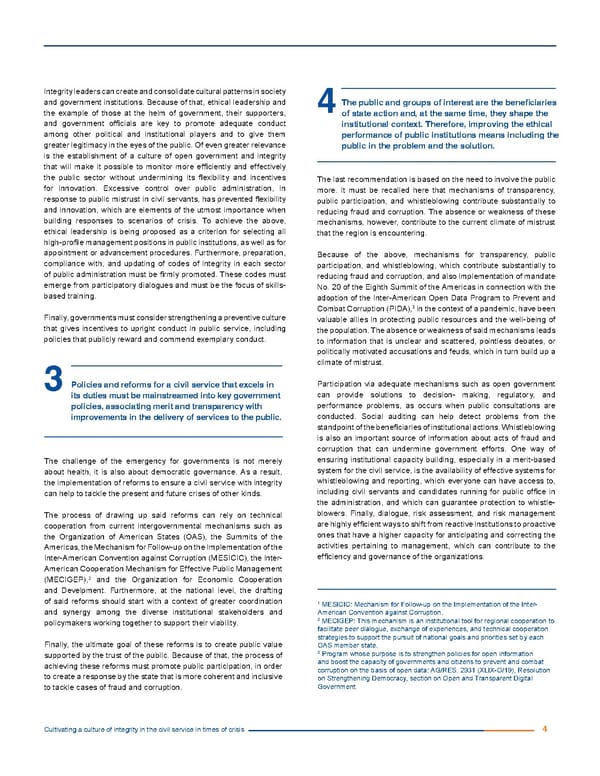Integrity leaders can create and consolidate cultural patterns in society and government institutions. Because of that, ethical leadership and The public and groups of interest are the beneficiaries the example of those at the helm of government, their supporters, 4 of state action and, at the same time, they shape the and government officials are key to promote adequate conduct institutional context. Therefore, improving the ethical among other political and institutional players and to give them performance of public institutions means including the greater legitimacy in the eyes of the public. Of even greater relevance public in the problem and the solution. is the establishment of a culture of open government and integrity that will make it possible to monitor more efficiently and effectively the public sector without undermining its flexibility and incentives The last recommendation is based on the need to involve the public for innovation. Excessive control over public administration, in more. It must be recalled here that mechanisms of transparency, response to public mistrust in civil servants, has prevented flexibility public participation, and whistleblowing contribute substantially to and innovation, which are elements of the utmost importance when reducing fraud and corruption. The absence or weakness of these building responses to scenarios of crisis. To achieve the above, mechanisms, however, contribute to the current climate of mistrust ethical leadership is being proposed as a criterion for selecting all that the region is encountering. high-profile management positions in public institutions, as well as for appointment or advancement procedures. Furthermore, preparation, Because of the above, mechanisms for transparency, public compliance with, and updating of codes of integrity in each sector participation, and whistleblowing, which contribute substantially to of public administration must be firmly promoted. These codes must reducing fraud and corruption, and also implementation of mandate emerge from participatory dialogues and must be the focus of skills- No. 20 of the Eighth Summit of the Americas in connection with the based training. adoption of the Inter-American Open Data Program to Prevent and Combat Corruption (PIDA),3 in the context of a pandemic, have been Finally, governments must consider strengthening a preventive culture valuable allies in protecting public resources and the well-being of that gives incentives to upright conduct in public service, including the population. The absence or weakness of said mechanisms leads policies that publicly reward and commend exemplary conduct. to information that is unclear and scattered, pointless debates, or politically motivated accusations and feuds, which in turn build up a climate of mistrust. Policies and reforms for a civil service that excels in Participation via adequate mechanisms such as open government 3 can provide solutions to decision- making, regulatory, and its duties must be mainstreamed into key government policies, associating merit and transparency with performance problems, as occurs when public consultations are improvements in the delivery of services to the public. conducted. Social auditing can help detect problems from the standpoint of the beneficiaries of institutional actions. Whistleblowing is also an important source of information about acts of fraud and corruption that can undermine government efforts. One way of The challenge of the emergency for governments is not merely ensuring institutional capacity building, especially in a merit-based about health, it is also about democratic governance. As a result, system for the civil service, is the availability of effective systems for the implementation of reforms to ensure a civil service with integrity whistleblowing and reporting, which everyone can have access to, can help to tackle the present and future crises of other kinds. including civil servants and candidates running for public office in the administration, and which can guarantee protection to whistle- The process of drawing up said reforms can rely on technical blowers. Finally, dialogue, risk assessment, and risk management cooperation from current intergovernmental mechanisms such as are highly efficient ways to shift from reactive institutions to proactive the Organization of American States (OAS), the Summits of the ones that have a higher capacity for anticipating and correcting the Americas, the Mechanism for Follow-up on the Implementation of the activities pertaining to management, which can contribute to the Inter-American Convention against Corruption (MESICIC), the Inter- efficiency and governance of the organizations. American Cooperation Mechanism for Effective Public Management (MECIGEP),2 and the Organization for Economic Cooperation and Develpment. Furthermore, at the national level, the drafting of said reforms should start with a context of greater coordination 1 MESICIC: Mechanism for Follow-up on the Implementation of the Inter- and synergy among the diverse institutional stakeholders and American Convention against Corruption. policymakers working together to support their viability. 2 MECIGEP: This mechanism is an institutional tool for regional cooperation to facilitate peer dialogue, exchange of experiences, and technical cooperation Finally, the ultimate goal of these reforms is to create public value strategies to support the pursuit of national goals and priorities set by each OAS member state. supported by the trust of the public. Because of that, the process of 3 Program whose purpose is to strengthen policies for open information achieving these reforms must promote public participation, in order and boost the capacity of governments and citizens to prevent and combat to create a response by the state that is more coherent and inclusive corruption on the basis of open data: AG/RES. 2931 (XLIX-O/19), Resolution on Strengthening Democracy, section on Open and Transparent Digital to tackle cases of fraud and corruption. Government. Cultivating a culture of integrity in the civil service in times of crisis 4
 Cultivating a culture of integrity in the civil service in times of crisis. Page 11 Page 13
Cultivating a culture of integrity in the civil service in times of crisis. Page 11 Page 13